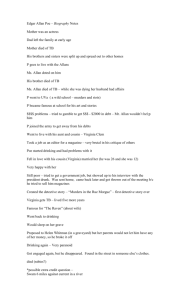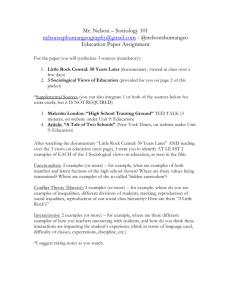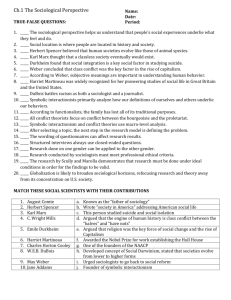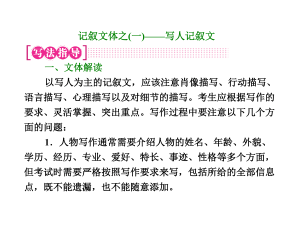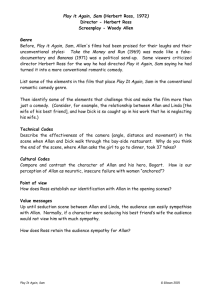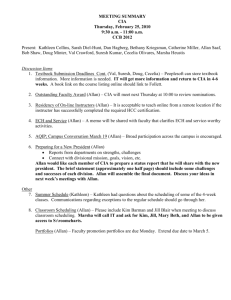Sociological Theory – Soc 153 Fall 2014 - TTH: 11:00
advertisement
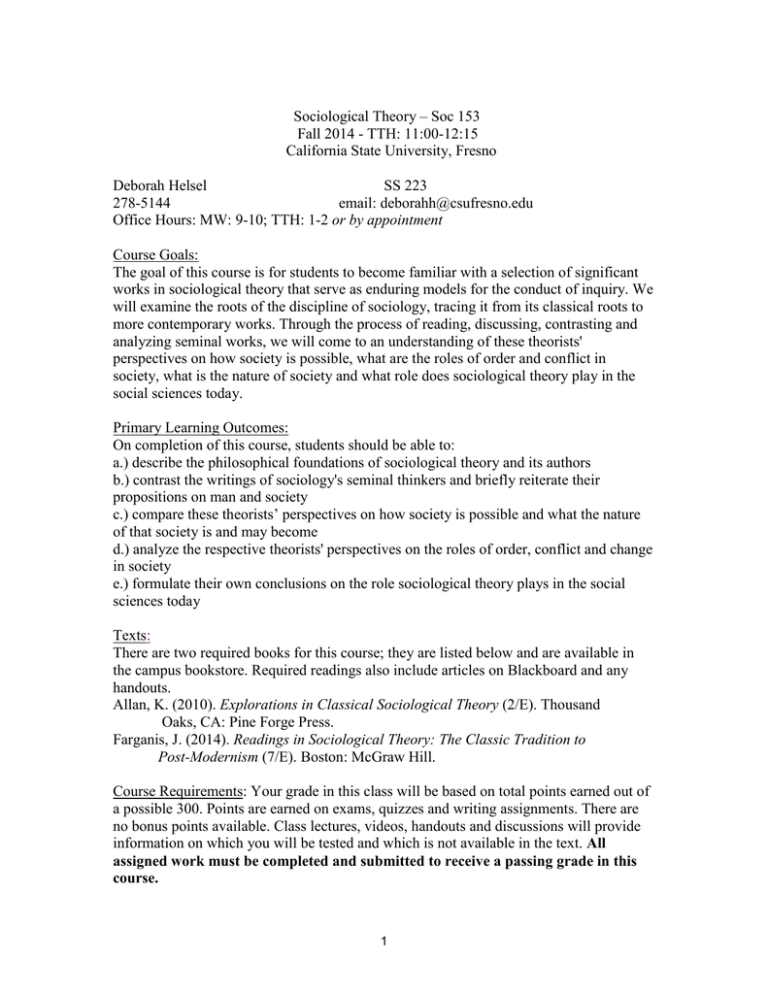
Sociological Theory – Soc 153 Fall 2014 - TTH: 11:00-12:15 California State University, Fresno Deborah Helsel SS 223 278-5144 email: deborahh@csufresno.edu Office Hours: MW: 9-10; TTH: 1-2 or by appointment Course Goals: The goal of this course is for students to become familiar with a selection of significant works in sociological theory that serve as enduring models for the conduct of inquiry. We will examine the roots of the discipline of sociology, tracing it from its classical roots to more contemporary works. Through the process of reading, discussing, contrasting and analyzing seminal works, we will come to an understanding of these theorists' perspectives on how society is possible, what are the roles of order and conflict in society, what is the nature of society and what role does sociological theory play in the social sciences today. Primary Learning Outcomes: On completion of this course, students should be able to: a.) describe the philosophical foundations of sociological theory and its authors b.) contrast the writings of sociology's seminal thinkers and briefly reiterate their propositions on man and society c.) compare these theorists’ perspectives on how society is possible and what the nature of that society is and may become d.) analyze the respective theorists' perspectives on the roles of order, conflict and change in society e.) formulate their own conclusions on the role sociological theory plays in the social sciences today Texts: There are two required books for this course; they are listed below and are available in the campus bookstore. Required readings also include articles on Blackboard and any handouts. Allan, K. (2010). Explorations in Classical Sociological Theory (2/E). Thousand Oaks, CA: Pine Forge Press. Farganis, J. (2014). Readings in Sociological Theory: The Classic Tradition to Post-Modernism (7/E). Boston: McGraw Hill. Course Requirements: Your grade in this class will be based on total points earned out of a possible 300. Points are earned on exams, quizzes and writing assignments. There are no bonus points available. Class lectures, videos, handouts and discussions will provide information on which you will be tested and which is not available in the text. All assigned work must be completed and submitted to receive a passing grade in this course. 1 Computers: At CSU Fresno, computers and communications links to remote resources are recognized as being integral to the education and research experience. Every student is required to have his/her own computer or have personal access to a workstation (including a modem and a printer) with all the recommended software. Computer labs are available on campus. Disabilities: If you have any medical or learning disabilities that might affect your work in this course, it is your responsibility to inform me and contact the University's Service to Students with Disabilities in the Library at 278-2811 so that reasonable accommodations can be made. Honor Code: "Members of the CSU Fresno academic community adhere to principles of academic integrity and mutual respect while engaged in university work and related activities." You should: a. understand or seek clarification about expectations for academic integrity in this course (including no cheating, plagiarism and inappropriate collaboration. b. neither give nor receive unauthorized aid on examinations or other course work that is used by the instructor as the basis of grading c. take responsibility to monitor academic dishonesty in any form and to report it to the instructor or other appropriate official for action. Cheating and Plagiarism: "Cheating is the actual or attempted practice of fraudulent or deceptive acts for the purpose of improving one's grade or obtaining course credit; such acts also include assisting another student to do so. Plagiarism is a specific form of cheating that consists of the misuse of the published and/or unpublished works of another by misrepresenting the material (i.e., their intellectual property) so used as one's own work" (University Catalog). Be aware that penalties for cheating and plagiarism range from a 0 or F on a particular assignment or exam through an F for the course or expulsion from the University. For more information on the University's policy on cheating and plagiarism, refer to the University Catalog. Copyright Policy: Copyright laws and fair use policies protect the rights of those who have produced the material. The copy in this course has been provided for private study, scholarship, or research. Other uses may require permission from the copyright holder. The user of this work is responsible for adhering to copyright law of the U.S. (Title 17, U.S. Code). To help you familiarize yourself with copyright and fair use policies, the University encourages you to visit its copyright web page. Digital Campus web sites contain material protected by copyrights held by the instructor, other individuals or institutions. Such material is used for educational purposes in accord with copyright law and/or with permission given by the owners of the original material. You may download one copy of the materials on any single computer for non-commercial, personal, or educational purposes only, provided that you (1) do not modify it, (2) use it only for the duration of this course, and, (3) include both this notice and any copyright notice originally included with the material. Beyond this use, no material from the course web site may be copied, reproduced, re-published, uploaded, posted, transmitted, or distributed in any way without the permission of the original copyright holder. The 2 instructor assumes no responsibility for individuals who improperly use copyrighted material placed on the web site. Classroom Etiquette: The most critical component of the classroom environment is respect. If we do not respect one another, we all lose the ability to grow and learn, which is the purpose of the classroom. Student conduct which disrupts the learning process will not be tolerated and may lead to disciplinary action. Do not use your cell phone during class; if you are observed doing so, I will deduct points from your quiz scores: 2 points for the first warning, 5 for the second, and 10 points for the third and every subsequent warning. Please do not "zip up" prior to the end of class; class begins and ends at the designated time. Do not begin packing up or stacking your stuff until then. Do not call or email me and ask if you missed anything; it is your responsibility to get notes and announcements from a classmate. Please do not engage in "private whispering." If you have a comment to make, share it with all of us or refrain from commenting. If you need to leave early, please let me know prior to class. While I may appreciate your reasons for coming late/leaving early or being absent, understand that the absence still exists and quizzes cannot be made up. Exams: There are three scheduled exams, including the final. The first two exams are each worth 50 points and the final, which includes cumulative material, is worth 75. The exams will cover lectures, text readings, handouts, videos, and discussion materials. Exams include multiple choice, true-false, short answer and essay questions. If you have a documented emergency, you may schedule a makeup. Makeup's consist entirely of essay questions. There can be no exposed screens during exams. Writing Assignments: There are two writing assignments. Each is due at the beginning of class on the date noted in the syllabus; five points per class session are deducted for late papers. Points are earned for content, organization, mechanics, and documentation. Papers can be APA, ASA or MLA format; they must be word-processed, double-spaced, standard font and proofed for errors. Do not use folders. We will discuss each paper in class before the due date. Writing Assignment 1: This is a short (2-3 pages) paper in which you will explain and apply classical theory. Select one of the following quotes, explain what the author meant and apply the concepts contained therein to a social phenomenon. Cite sources to support your interpretation and application. You may use assigned texts as references. Your paper must conclude with a reference list of at least three references. This paper is due Sept. 23 and is worth 25 points. a. “Since the division of labor becomes the predominant source of social solidarity, at the same time it becomes the foundation of the moral order.” (Durkheim, The Division of Labor in Society) b. “The class which has the means of material production at its disposal, has control at the same time over the means of mental production, so that thereby, the ideas of those who lack the means of mental production are subject to it.” (Marx, The German Ideology) c. “The Puritan wanted to work in a calling; we are forced to do so. …[Capitalism] today determines the lives of all the individuals who are born into this mechanism…. (Weber, The Protestant Ethic and the Spirit of Capitalism) 3 Writing Assignment 2: Contemporary theorists build on the work of classical theorists. In this 3-4 page paper, you will connect the works of any of the following pairs of theorists on the topic indicated. Select one of the following pairs of classical and contemporary theorists, briefly explain the work of each on the topic indicated and clarify how the contemporary work extends the work of the classical theorist. You may use assigned texts as references. The paper is due Nov. 20 and is worth 50 points. a. Weber and Ritzer on bureaucracies b. Durkheim and Parsons on social control c. Marx and Mills on political power d. Mead and Berger and Luckmann on social construction of self Attendance: At unscheduled times during the semester, we will have pop quizzes; each will be worth 5 points for a total of 50. Since this is a device to measure attendance, there are no makeups. These may be given at any time during class. Your pattern of attendance, evidenced through these scores, will be an important part of calculating your course grade. If you arrive after a quiz has begun or leave before it is administered, you may be allowed to turn in your name on a blank quiz for 2 points. The grading scale is as follows: Total points 270-300 240-269 195-239 150-194 under 150 Percent of Total 90-100% 80-89% 65-79% 50-64% under 50% Final Grade A B C D F Course Schedule: Assigned readings are to be completed before the date for which they are listed. Week 1 August 21 Week 2 August 26 August 28 Week 3 September 2 September 4 Syllabus Discussion and Course Overview No reading Introduction of theorists Foundation and Roots Allan: Chapter 1 Foundation and Roots Allan: Chapter 1 Marx Allan: Chapter 3 Marx Allan: Chapter 3 Farganis: Introduction to Marx section; Manifesto 4 Week 4 September 9 September 11 Week 5 September 16 September 18 Week 6 September 23 September 25 Week 7 September 30 October 2 Week 8 October 7 October 9 Week 9 October 14 October 16 Durkheim Allan: Chapter 4 Durkheim Allan: Chapter 4 Farganis: Introduction to Durkhein section; Elementary Forms Weber Allan: Chapter 5 Weber Allan: Chapter 5 Farganis: Power, Domination and Types of Authority Writing Assignment 1 due Simmel Farganis: Introduction to Georg Simmel section; The Stranger Summary and Review for Exam 1 Exam 1 Power and Conflict: W.E.B. DuBois and C. Wright Mills Farganis: Introduction to W.E.B. DuBois section; Souls of Black Folks Power and Conflict: W.E.B. DuBois and C. Wright Mills Farganis: Structure of Power in America Mead – Allan: Chapter 7 Mead Allan: Chapter 7 Farganis: Introduction and Mind, Self and Society Parsons Allan: Chapter 10 Parsons Allan: Chapter 10 The Sick Role (Bb) 5 Week 10 October 21 October 23 Week 11 October 28 Symbolic Interactionism: Goffman and Hochschild Farganis: Goffman: Presentation of Self; Hochschild: Managed Heart Symbolic Interactionism/ Feminist Theory: Smith and Hill Collins Farganis: Smith: Women's Experience Hill Collins: Mammies and Matriarchs (Bb) October 30 Feminist Theory: Smith and Hill Collins Farganis: Smith: Women's Experience Hill Collins: Mammies and Matriarchs (Bb) Review for Exam 2 Week 12 November 4 November 6 Exam 2 Ritzer: McDonaldization (Bb) Week 13 November 11 November 13 Week 14 November 18 November 20 Week 15 November 25 November 27 Week 16 December 2 December 4 Holiday Ritzer: McDonaldization (Bb) Berger: Excerpts from Invitation to Sociology (Bb) Berger Invitation to Sociology (Bb) Writing Assignment 2 due Berger and Luckmann Theory and Application Murphy: Drifting into Dealing (Bb) Holiday Theory and Application Drifting into Dealing Begin review for final exam 6 Week 17 December 9 December 11 Review for final exam Last day of instruction Faculty Consultation Day - no class Final Exam: Tuesday, December 16: 11-1 This course syllabus is subject to change in the event of extenuating circumstances. 7
